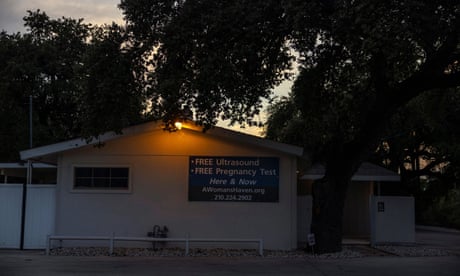- by foxnews
- 23 May 2025
Google misdirects one in 10 searches for abortion to ‘pregnancy crisis centers’
Google misdirects one in 10 searches for abortion to ‘pregnancy crisis centers’
- by theguardian
- 10 Jun 2022
- in news

One in 10 Google searches for abortion services in US "trigger states", where the procedure is likely to become illegal if the US supreme court overturns Roe v Wade, are being misdirected to clinics known as "pregnancy crisis centers" that do not actually provide care, according to a new study.
After a leak revealed the US supreme court is on the verge of overturning the landmark abortion rights law Roe v Wade, attention has turned to "trigger law" states that would ban abortion immediately if the decades-old decision is undone.
In more than a dozen such trigger-law states, researchers found, 11% of Google search results for "abortion clinic near me" and "abortion pill" led to "crisis pregnancy centers", according to misinformation research non-profit Center for Countering Digital Hate (CCDH).
These clinics market themselves as healthcare providers but have a "shady, harmful agenda", according to the reproductive health non-profit Planned Parenthood, offering no health services and aiming instead to dissuade people from having abortions.
Such centers now outnumber real abortion clinics three to one, with approximately 2,600 operating in the US, according to a study by the Alliance, a coalition of state advocates for women's rights and gender equality.
"Anti-abortion fake clinics are the conversion 'therapy' wing of an anti-abortion movement that is hell-bent on sending people to jail for abortion, miscarriage and pregnancy," said Erin Matson, co-founder and executive director of pro-choice organization Reproaction.
Researchers in the study used location-altering tools to study 13 trigger-law states including Wyoming, Utah, Texas, Tennessee and Missouri and found 37% of Google Maps searches led to fake clinics.
Meanwhile, nearly 28% of Google ads displayed at the top of such search result pages were for anti-abortion fake clinics. One such ad from the Cline Centers in Mississippi appeared to offer free abortion consultations, but reviews alleged that the "fake clinic" does not "provide medical care" and "exaggerate[s]" the risks of abortion. Further investigation showed the clinic neither performs nor provides referrals for abortion procedures.
While Google labels the anti-abortion advertising with a disclaimer that reads "does not provide abortions", the ads often appeared at the top of abortion services searches. Studies show these misleading results can confuse users seeking abortions, many of whom overlook these disclaimers and contact the fake clinics.
"Misleading online advertising targeting abortion seekers is not a new concern, although it becomes more urgent as constitutional protections for abortion disappear," Matson said.
The study has renewed calls for legislation to rein in the power of Big Tech. Google controls 90% of the online search market, making it difficult for users to find alternatives.
A spokesperson for Google said the company has longstanding policies that require any organization seeking to advertise to people seeking abortion services to be certified and "show in-ad disclosures that clearly state whether they do or do not offer abortions".
"Across our products, we work to make high-quality information easily accessible, particularly on critical health topics," he said. "We're always looking at ways to improve our results to help people find what they're looking for, or understand if what they're looking for may not be available."
"We have a right to expect that safety by design is a key consideration for any tech platform," said Imran Ahmed, chief executive of the Center for Countering Digital Hate. "If Google refuses to guarantee users' right to good information, it will be up to lawmakers to step in to ensure that people aren't harmed by Google's negligence and greed."
- by foxnews
- descember 09, 2016
United Airlines flight returns to Hawaii after concerning message found on bathroom mirror; FBI investigating
United Airlines Flight 1169 to Los Angeles returned to Hawaii after a "potential security concern" aboard the plane. The FBI and police are investigating.
read more


